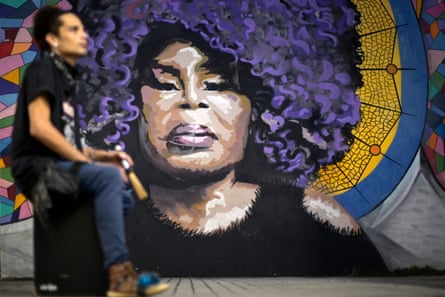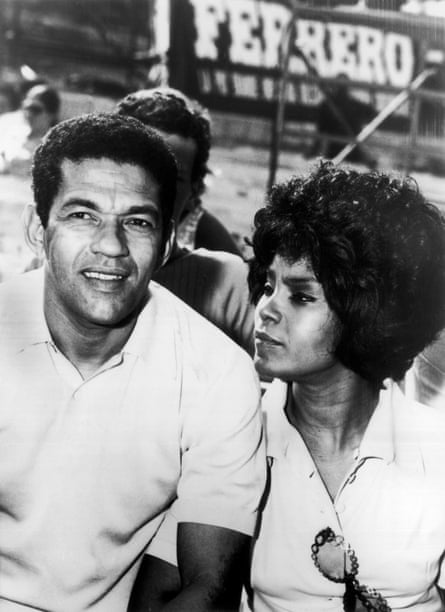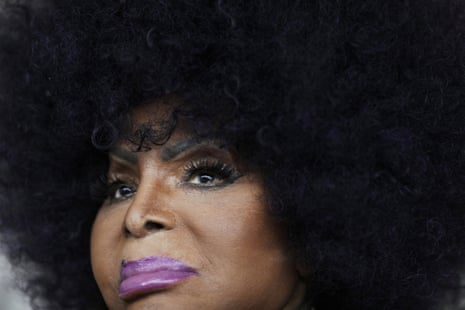Elza Soares stood quietly, a few minutes before being born into music. Engulfed by audience fuss and hullabaloo, another of her competitors had been disqualified from the radio talent show she was attending. It was 1953, and Soares had just one chance to bring home the cash prize – she needed it to help care for her unwell son. She was still a teenager and, once on stage, her oversized, ragged dress would make the audience explode into laughter. “What’s the planet you came from?” asked the host, waiting for the gag’s cue. “I’m from Planet Hunger,” she said. Silence took hold of the venue, and Elza sang for the first time. She never stopped, until her death this week aged 91.
Over the decades, the Brazilian artist became a staple for samba, a mainstay of her nation’s songbook and a singer that shared a global pantheon with Ella Fitzgerald and Billie Holiday. Dubbed the “voice of the millennium” by the BBC in 1999, Elza met the Planet Hunger as few did: a Black woman born in Rio’s favelas, who faced down racism, sexism and classism with brilliant verve.
“My vocal cords are crooked, just like my life,” Elza said on a TV show in the 90s. Born in 1930, the singer developed her signature move at an early age: a deep, vibrato-like tone that melded melody and percussive hints. The technique, operating in the sweet spot between scat singing and vocal fry, printed a rugged and flexible guttural texture on to her voice. Many tried to draw a connection to Louis Armstrong’s singing style, but she always denied it. Not only were their growling voices performed using different regions of the throat, Elza had never heard of the jazzman before their first encounter in 1962. “He called me daughter,” she revealed years later.

The opening track of Elza’s first album, A Bossa Negra (The Black Bossa) from 1961, showcases the singer’s powerful and unrestrained vocals; the up-and-coming act had grown to sound sounds like an experienced performer. She juggles with head and chest voices, and wanders with improvisation in the studio while playing around with individual syllables in a growling solfeggio.
Elza kept pushing the boundaries of samba in the years that followed, hopping around its various subgenres. She recorded slow-paced, highly orchestrated samba-canções, danceable sambalanço and sambas de gafieira tracks, top-charting bossa nova songs, and cool samba-jazz standards with the likes of Wilson das Neves – all of that while thriving as a crooner on the live circuit, and a singer on radio and TV.
Throughout the 60s, Soares epitomised modernity in Brazil’s national music, helping to open a dialogue within a country that that was looking to build for the future under Juscelino Kubitschek’s presidency.
Her airy, upbeat approach grew more complex in the 70s. Soares kept on expanding the samba language, bringing more raucous carnaval-style samba, Afro-oriented songs, and innovations such as the partido-alto subgenre – where soloists and choruses jostle playfully with one another – to her repertoire. Her recording of the song Malandro, for instance, helped popularise Jorge Aragão, one of the greatest partido-alto sambistas in Brazil.
But the singer also embraced a sense of melancholy. She had been a child bride at 12 and her first husband died when she was barely out of her teens; after the world-famous footballer Garrincha divorced his wife to become Soares’s second husband, she faced a conservative society’s judging eyes. Garrincha’s alcoholism and abuse would later push Soares to the edge – her mother died in a car accident when he had been driving drunk – and she split with him in early 80s.

Despite having showed she was more than just a samba singer or a crooner, and pushing forward the persona of a song interpreter – just look at her bright feature on Caetano Veloso’s 1984 rap song Língua – it took until the late 2010s for Soares to regain the success of her early days. That comeback began in 2000 when, after decades of erratic productions and struggles with debts, she debuted a new show, Dura na Queda – Tough as Nails.
Her renewed energy was fuelled by a new generation of artists who had rediscovered her grandiloquent vocals. “She crossed Brazilian music from bossa and samba – she’s a gift to us”, said musician José Miguel Wisnik in a video for Elza’s 90th birthday. The pianist was one of her most important music partners in her later career, and together they released the 2002 blaxploitation-flavoured album Do Cóccix Até O Pescoço.
In the last decade, Elza finally rediscovered her musical elan. She became a unique figure, an ancestral oracle who was also a willing pupil; she was praised by artists and a younger audience while going further in experimentation and performance.
Elza teamed up with artists from São Paulo’s avant garde in the 2015 opera-samba Mulher do Fim do Mundo. “I am the woman of the end of the world,” she sang. In 2018’s Deus é Mulher, she sings – with palpable fury – about the struggles faced by Black women in Brazilian society and the prejudice against Afro-religions and the LGBTQI+ community, all in the shape of broken-tempo samba songs. Planeta Fome, released in 2019, nods to her early days of Planet Hunger while speaking to the famine that made a comeback to Brazil in recent years.
Her last three albums, which form a trilogy, mirror a convoluted country. But they also point to fresh routes in society and music – from fusions of samba with rap, to electronic textures. They are full of passion and drama that Soares drew from her life story, and an unbeatable hunger for disobeying what was prescribed for her. Elza Soares did not just embrace the revolutionary, liberating countercultural spirit in Brazil as the 20th century became the 21st – she was that spirit.
